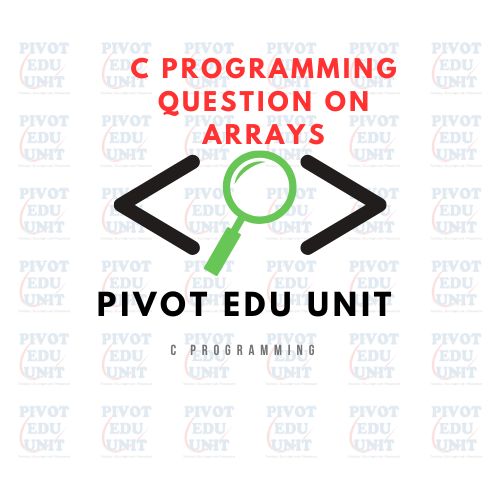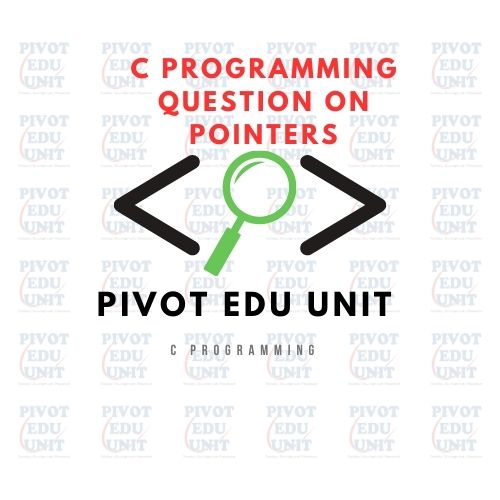Write a C program to swap two integers using pointers.
#include <stdio.h>
void swap(int *a, int *b) {
int temp = *a;
*a = *b;
*b = temp;
}
int main() {
int x = 5, y = 10;
printf("Before swapping: x = %d, y = %d\n", x, y);
swap(&x, &y);
printf("After swapping: x = %d, y = %d\n", x, y);
return 0;
}
Write a C program to find the sum of elements in an array using pointers.
#include <stdio.h>
int arraySum(int *arr, int size) {
int sum = 0;
for (int i = 0; i < size; i++) {
sum += *(arr + i);
}
return sum;
}
int main() {
int arr[] = {1, 2, 3, 4, 5};
int size = sizeof(arr) / sizeof(arr[0]);
printf("Sum of array elements: %d\n", arraySum(arr, size));
return 0;
}
Write a C program to reverse a string using pointers.
#include <stdio.h>
#include <string.h>
void reverseString(char *str) {
int length = strlen(str);
char *start = str;
char *end = str + length - 1;
while (start < end) {
char temp = *start;
*start = *end;
*end = temp;
start++;
end--;
}
}
int main() {
char str[] = "hello";
printf("Before reversing: %s\n", str);
reverseString(str);
printf("After reversing: %s\n", str);
return 0;
}
Write a C program to find the maximum element in an array using pointers.
#include <stdio.h>
int findMax(int *arr, int size) {
int max = *arr;
for (int i = 1; i < size; i++) {
if (*(arr + i) > max) {
max = *(arr + i);
}
}
return max;
}
int main() {
int arr[] = {5, 10, 3, 8, 15};
int size = sizeof(arr) / sizeof(arr[0]);
printf("Maximum element in array: %d\n", findMax(arr, size));
return 0;
}
Write a C program to count the number of vowels in a string using pointers.
#include <stdio.h>
#include <ctype.h>
int countVowels(char *str) {
int count = 0;
while (*str != '\0') {
char c = tolower(*str);
if (c == 'a' || c == 'e' || c == 'i' || c == 'o' || c == 'u') {
count++;
}
str++;
}
return count;
}
int main() {
char str[] = "Hello, World!";
printf("Number of vowels: %d\n", countVowels(str));
return 0;
}
Write a C program to concatenate two strings using pointers.
#include <stdio.h>
void concatenateStrings(char *dest, const char *src) {
while (*dest != '\0') {
dest++;
}
while (*src != '\0') {
*dest = *src;
dest++;
src++;
}
*dest = '\0';
}
int main() {
char str1[20] = "Hello";
char str2[] = " World!";
concatenateStrings(str1, str2);
printf("Concatenated string: %s\n", str1);
return 0;
}
Write a C program to count the occurrences of a character in a string using pointers.
#include <stdio.h>
int countOccurrences(char *str, char ch) {
int count = 0;
while (*str != '\0') {
if (*str == ch) {
count++;
}
str++;
}
return count;
}
int main() {
char str[] = "hello world";
char ch = 'l';
printf("Occurrences of '%c': %d\n", ch, countOccurrences(str, ch));
return 0;
}
Write a C program to check if a string is a palindrome using pointers.
#include <stdio.h>
#include <stdbool.h>
#include <string.h>
bool isPalindrome(char *str) {
int length = strlen(str);
char *start = str;
char *end = str + length - 1;
while (start < end) {
if (*start != *end) {
return false;
}
start++;
end--;
}
return true;
}
int main() {
char str[] = "radar";
if (isPalindrome(str)) {
printf("The string is a palindrome.\n");
} else {
printf("The string is not a palindrome.\n");
}
return 0;
}
Write a C program to find the length of a string using pointers.
#include <stdio.h>
int stringLength(char *str) {
int length = 0;
while (*str != '\0') {
length++;
str++;
}
return length;
}
int main() {
char str[] = "hello";
printf("Length of string: %d\n", stringLength(str));
return 0;
}
Write a C program to copy one string to another using pointers.
#include <stdio.h>
void stringCopy(char *dest, const char *src) {
while (*src != '\0') {
*dest = *src;
dest++;
src++;
}
*dest = '\0';
}
int main() {
char str1[20];
char str2[] = "Hello";
stringCopy(str1, str2);
printf("Copied string: %s\n", str1);
return 0;
}
Write a C program to find the factorial of a number using pointers.
#include <stdio.h>
int factorial(int n) {
int result = 1;
for (int i = 1; i <= n; i++) {
result *= i;
}
return result;
}
int main() {
int num = 5;
printf("Factorial of %d: %d\n", num, factorial(num));
return 0;
}
Write a C program to sort an array of integers using pointers.
#include <stdio.h>
void bubbleSort(int *arr, int size) {
for (int i = 0; i < size - 1; i++) {
for (int j = 0; j < size - i - 1; j++) {
if (*(arr + j) > *(arr + j + 1)) {
int temp = *(arr + j);
*(arr + j) = *(arr + j + 1);
*(arr + j + 1) = temp;
}
}
}
}
int main() {
int arr[] = {5, 2, 8, 1, 4};
int size = sizeof(arr) / sizeof(arr[0]);
bubbleSort(arr, size);
printf("Sorted array: ");
for (int i = 0; i < size; i++) {
printf("%d ", arr[i]);
}
printf("\n");
return 0;
}
Write a C program to reverse an array using pointers.
#include <stdio.h>
void reverseArray(int *arr, int size) {
int *start = arr;
int *end = arr + size - 1;
while (start < end) {
int temp = *start;
*start = *end;
*end = temp;
start++;
end--;
}
}
int main() {
int arr[] = {1, 2, 3, 4, 5};
int size = sizeof(arr) / sizeof(arr[0]);
reverseArray(arr, size);
printf("Reversed array: ");
for (int i = 0; i < size; i++) {
printf("%d ", arr[i]);
}
printf("\n");
return 0;
}
Write a C program to check if two strings are anagrams using pointers.
#include <stdio.h>
#include <stdbool.h>
#include <string.h>
bool areAnagrams(char *str1, char *str2) {
int count[256] = {0};
while (*str1 != '\0') {
count[(int)*str1]++;
str1++;
}
while (*str2 != '\0') {
count[(int)*str2]--;
str2++;
}
for (int i = 0; i < 256; i++) {
if (count[i] != 0) {
return false;
}
}
return true;
}
int main() {
char str1[] = "listen";
char str2[] = "silent";
if (areAnagrams(str1, str2)) {
printf("The strings are anagrams.\n");
} else {
printf("The strings are not anagrams.\n");
}
return 0;
}
Write a C program to find the largest and smallest elements in an array using pointers.
#include <stdio.h>
void findMinMax(int *arr, int size, int *max, int *min) {
*max = *min = *arr;
for (int i = 1; i < size; i++) {
if (*(arr + i) > *max) {
*max = *(arr + i);
}
if (*(arr + i) < *min) {
*min = *(arr + i);
}
}
}
int main() {
int arr[] = {5, 10, 3, 8, 15};
int size = sizeof(arr) / sizeof(arr[0]);
int max, min;
findMinMax(arr, size, &max, &min);
printf("Largest element: %d\n", max);
printf("Smallest element: %d\n", min);
return 0;
}
Write a C program to multiply two matrices using pointers.
#include <stdio.h>
void matrixMultiply(int *mat1, int *mat2, int *result, int rows1, int cols1, int cols2) {
for (int i = 0; i < rows1; i++) {
for (int j = 0; j < cols2; j++) {
*(result + i * cols2 + j) = 0;
for (int k = 0; k < cols1; k++) {
*(result + i * cols2 + j) += *((mat1 + i * cols1) + k) * *((mat2 + k * cols2) + j);
}
}
}
}
void displayMatrix(int *matrix, int rows, int cols) {
for (int i = 0; i < rows; i++) {
for (int j = 0; j < cols; j++) {
printf("%d ", *((matrix + i * cols) + j));
}
printf("\n");
}
}
int main() {
int mat1[2][3] = {
{1, 2, 3},
{4, 5, 6}
};
int mat2[3][2] = {
{7, 8},
{9, 10},
{11, 12}
};
int result[2][2];
matrixMultiply((int *)mat1, (int *)mat2, (int *)result, 2, 3, 2);
printf("Resultant matrix:\n");
displayMatrix((int *)result, 2, 2);
return 0;
}
Write a program in C to print all the alphabets using a pointer.
#include <stdio.h>
int main() {
char *ptr; // Declare a pointer to char
printf("Alphabets: ");
// Initialize the pointer to point to the starting address of the alphabet 'A'
ptr = "ABCDEFGHIJKLMNOPQRSTUVWXYZ";
// Loop through the string until the null terminator is reached
while (*ptr != '\0') {
printf("%c ", *ptr); // Print the character at the current pointer location
ptr++; // Move the pointer to the next character
}
printf("\n");
return 0;
}
Write a C program to print all the digits from 0 to 9 using a pointer.
#include <stdio.h>
int main() {
char *ptr; // Declare a pointer to char
printf("Digits: ");
// Initialize the pointer to point to the starting address of the digits '0' to '9'
ptr = "0123456789";
// Loop through the string until the null terminator is reached
while (*ptr != '\0') {
printf("%c ", *ptr); // Print the character at the current pointer location
ptr++; // Move the pointer to the next character
}
printf("\n");
return 0;
}
Write a C program to print all the lowercase letters from ‘a’ to ‘z’ using a pointer.
#include <stdio.h>
int main() {
char *ptr; // Declare a pointer to char
printf("Lowercase letters: ");
// Initialize the pointer to point to the starting address of the lowercase letters 'a' to 'z'
ptr = "abcdefghijklmnopqrstuvwxyz";
// Loop through the string until the null terminator is reached
while (*ptr != '\0') {
printf("%c ", *ptr); // Print the character at the current pointer location
ptr++; // Move the pointer to the next character
}
printf("\n");
return 0;
}




